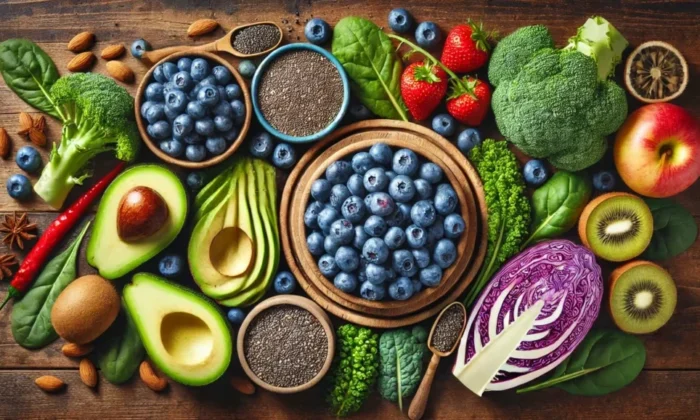Chia Seeds: The Fiber King
Chia seeds might look like tiny dots, but don’t underestimate them. They’re ridiculously high in fiber, packing 34g per 100g. That’s almost five times what avocado offers. If your goal is to stay full for longer or improve gut health, chia seeds are a fiber powerhouse. Plus, they’re one of the best plant-based sources of omega-3 fatty acids, which are fantastic for brain and heart health.
But here’s the thing: chia seeds aren’t as versatile or tasty as avocados. You can’t exactly slice them into toast or mix them into a savory salad. They shine more in smoothies, puddings, or as a sprinkle in yogurt.
💙 Did You Know?
Just two tablespoons of chia seeds contain 10g of fiber —almost half of your daily recommended intake. That’s a big win for your gut health.
Blueberries: The Antioxidant Heroes
Blueberries are the sweet, snackable superfood. They’re low in calories, high in Vitamin C, and absolutely bursting with antioxidants. These little berries are great for fighting inflammation and boosting brain health. They might not have the fats or fiber of an avocado, but they’re a perfect option for a quick, healthy treat.
Blueberries are also packed with flavonoids, which research shows can improve memory and lower the risk of heart disease.
💙 Highlighted Fact:
A study published in the Journal of Agricultural and Food Chemistry found that eating blueberries regularly can reduce oxidative stress by 20% , improving memory and reducing age-related brain decline.
Kale: The Nutrient Powerhouse
Oh, Kale. It’s the poster child for leafy greens and for good reason. Loaded with Vitamin K (200% of your daily value in just 100g!), Vitamin C, and even calcium. It’s also low in calories—just 35 per 100g—making it a great choice for weight-conscious eaters. However, kale lacks the healthy fats that make avocado such a unique superfood.
While kale might not win the taste test against a creamy avocado, it’s a superstar in the nutrients department. Whether blended into a smoothie or baked into chips, it’s a fantastic way to add vitamins and minerals to your diet.
💙 Expert Opinion:
Dr. Lisa Fields, a dietitian, says, “Kale’s high Vitamin C content makes it excellent for immune health. When paired with avocado, its fat-soluble vitamins like Vitamin K and A are absorbed more efficiently.”
Avocado: The Balanced Superfood
Avocado kind of feels like the all-rounder in the superfood league. Let’s break it down further.
Healthy Fats for a Healthy Heart
Avocados are famous for their monounsaturated fats. These fats aren’t just good—they’re great for reducing bad cholesterol (LDL) and increasing good cholesterol (HDL). That’s why avocados are often linked to heart health.
💙 Quick Fact:
A study in the American Journal of Clinical Nutrition found that people who regularly ate avocados reduced their LDL cholesterol by 16% on average , lowering their risk of heart disease.
Fiber That Keeps You Feeling Full
Fiber is your body’s natural appetite controller. And avocado? It delivers 7g per 100g. That’s not as crazy as chia seeds, but it’s still a lot more than most fruits and vegetables. This makes avocados a great option if you’re trying to stay full and satisfied between meals.
💙 Pro Tip:
Try adding avocado to your breakfast—like a slice of avocado toast or a smoothie. You’ll feel fuller for longer without reaching for snacks.
Packed with Vitamins and Minerals
Avocado isn’t just about fats and fiber—it’s a nutritional treasure chest. Here’s what it brings to the table:
- Potassium: More than a banana! Helps regulate blood pressure.
- Vitamin K: Supports bone health and blood clotting.
- Folate: Essential for brain function and healthy cells.
- Vitamin E: Keeps your skin glowing and fights inflammation.
💙 Highlighted Insight:
One avocado provides 26% of your daily Vitamin K needs , which is important for bone health and blood clotting. It’s like nature’s multivitamin, but tastier.
Expert Opinions on Avocado
We asked dietitians why avocados deserve a spot in your diet. Here’s what they had to say:
💙 Expert Take:
“Avocados are unique because they combine healthy fats, fiber, and essential nutrients in one food. This makes them an excellent choice for overall health, whether you’re looking to improve heart health, gut health, or just stay energized throughout the day,” says registered dietitian Sarah Jones.
Visual Comparisons: Nutrient Density and Macronutrients
Let’s look at how avocado stacks up in terms of nutrients and macronutrients through some visuals.
Nutrient Density Comparison

- Compares fat, fiber, and protein content across avocados, chia seeds, blueberries, and kale.
- Highlights the strengths of each superfood.
Macronutrient Breakdown for Avocado
Here’s a quick breakdown:
- Fat: 77% (mostly healthy monounsaturated fats)
- Carbs: 19% (mostly fiber)
- Protein: 4%

- Shows the percentage of calories from fats, carbs, and protein in avocado.
- Emphasizes the dominance of healthy fats in avocados.
Why Avocado Is Special
So, is avocado the ultimate superfood? Not exactly—but it’s definitely in the top tier. While chia seeds, blueberries, and kale have their standout qualities, avocado’s unique mix of healthy fats, fiber, and essential nutrients make it one of the most versatile and satisfying superfoods around. Plus, let’s be honest—nothing beats guac, right?
💙 Key Takeaway:
When you combine avocado with other superfoods like kale or chia seeds, you’re not just eating healthy—you’re supercharging your meals. Try adding avocado to a kale salad or blending it into a smoothie with blueberries and chia seeds. You’ll get the best of all worlds!



